Analysis of Four Leadership Styles in Clinical Nursing Practice
VerifiedAdded on 2020/10/23
|10
|2504
|288
Report
AI Summary
This report delves into the application of four distinct leadership styles – autocratic, laissez-faire, transactional, and transformational – within the context of a registered nurse's role. It begins by emphasizing the importance of effective clinical leadership in fostering high-quality healthcare and patient safety, defining leadership as the ability to influence and guide individuals and teams toward organizational goals. The main body of the report explores each leadership style, providing clear clinical examples to illustrate their practical application. Autocratic leadership is presented as suitable for simple tasks, while laissez-faire leadership is characterized by minimal supervision. Transactional leadership is highlighted for its focus on supervision and performance, and transformational leadership is showcased for its ability to inspire and motivate. The report concludes by reiterating the importance of leadership behaviors and practices in achieving successful clinical outcomes, emphasizing the critical role of clinical nurse leaders in organizing their units and driving effective care.

4 LEADERSHIP STYLES IN
REGISTERED NURSE’S ROLE
REGISTERED NURSE’S ROLE
Paraphrase This Document
Need a fresh take? Get an instant paraphrase of this document with our AI Paraphraser

Table of Contents
INTRODUCTION ..........................................................................................................................1
MAIN BODY...................................................................................................................................1
CONCLUSION................................................................................................................................5
REFERENCES................................................................................................................................8
INTRODUCTION ..........................................................................................................................1
MAIN BODY...................................................................................................................................1
CONCLUSION................................................................................................................................5
REFERENCES................................................................................................................................8
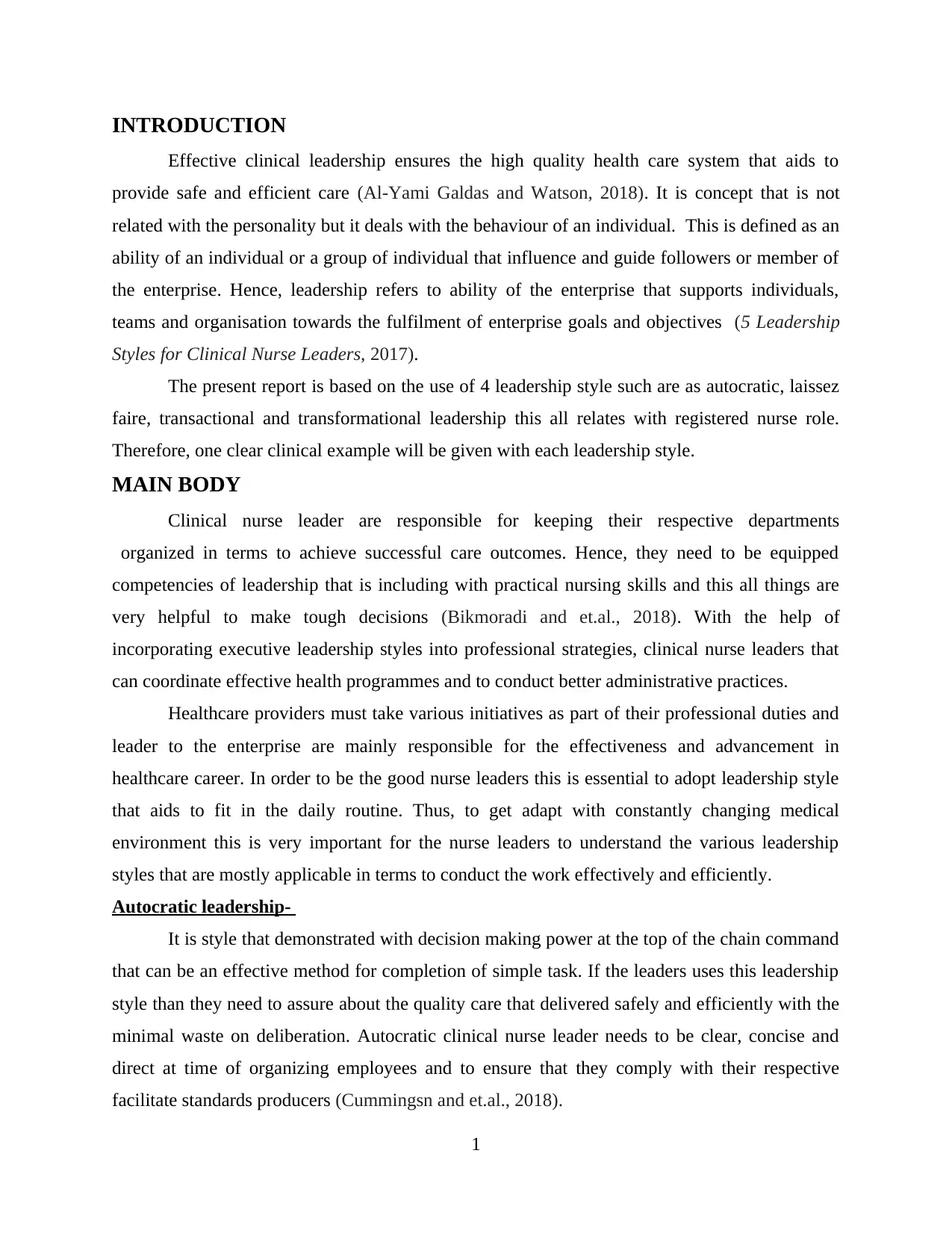
INTRODUCTION
Effective clinical leadership ensures the high quality health care system that aids to
provide safe and efficient care (Al‐Yami Galdas and Watson, 2018). It is concept that is not
related with the personality but it deals with the behaviour of an individual. This is defined as an
ability of an individual or a group of individual that influence and guide followers or member of
the enterprise. Hence, leadership refers to ability of the enterprise that supports individuals,
teams and organisation towards the fulfilment of enterprise goals and objectives (5 Leadership
Styles for Clinical Nurse Leaders, 2017).
The present report is based on the use of 4 leadership style such are as autocratic, laissez
faire, transactional and transformational leadership this all relates with registered nurse role.
Therefore, one clear clinical example will be given with each leadership style.
MAIN BODY
Clinical nurse leader are responsible for keeping their respective departments
organized in terms to achieve successful care outcomes. Hence, they need to be equipped
competencies of leadership that is including with practical nursing skills and this all things are
very helpful to make tough decisions (Bikmoradi and et.al., 2018). With the help of
incorporating executive leadership styles into professional strategies, clinical nurse leaders that
can coordinate effective health programmes and to conduct better administrative practices.
Healthcare providers must take various initiatives as part of their professional duties and
leader to the enterprise are mainly responsible for the effectiveness and advancement in
healthcare career. In order to be the good nurse leaders this is essential to adopt leadership style
that aids to fit in the daily routine. Thus, to get adapt with constantly changing medical
environment this is very important for the nurse leaders to understand the various leadership
styles that are mostly applicable in terms to conduct the work effectively and efficiently.
Autocratic leadership-
It is style that demonstrated with decision making power at the top of the chain command
that can be an effective method for completion of simple task. If the leaders uses this leadership
style than they need to assure about the quality care that delivered safely and efficiently with the
minimal waste on deliberation. Autocratic clinical nurse leader needs to be clear, concise and
direct at time of organizing employees and to ensure that they comply with their respective
facilitate standards producers (Cummingsn and et.al., 2018).
1
Effective clinical leadership ensures the high quality health care system that aids to
provide safe and efficient care (Al‐Yami Galdas and Watson, 2018). It is concept that is not
related with the personality but it deals with the behaviour of an individual. This is defined as an
ability of an individual or a group of individual that influence and guide followers or member of
the enterprise. Hence, leadership refers to ability of the enterprise that supports individuals,
teams and organisation towards the fulfilment of enterprise goals and objectives (5 Leadership
Styles for Clinical Nurse Leaders, 2017).
The present report is based on the use of 4 leadership style such are as autocratic, laissez
faire, transactional and transformational leadership this all relates with registered nurse role.
Therefore, one clear clinical example will be given with each leadership style.
MAIN BODY
Clinical nurse leader are responsible for keeping their respective departments
organized in terms to achieve successful care outcomes. Hence, they need to be equipped
competencies of leadership that is including with practical nursing skills and this all things are
very helpful to make tough decisions (Bikmoradi and et.al., 2018). With the help of
incorporating executive leadership styles into professional strategies, clinical nurse leaders that
can coordinate effective health programmes and to conduct better administrative practices.
Healthcare providers must take various initiatives as part of their professional duties and
leader to the enterprise are mainly responsible for the effectiveness and advancement in
healthcare career. In order to be the good nurse leaders this is essential to adopt leadership style
that aids to fit in the daily routine. Thus, to get adapt with constantly changing medical
environment this is very important for the nurse leaders to understand the various leadership
styles that are mostly applicable in terms to conduct the work effectively and efficiently.
Autocratic leadership-
It is style that demonstrated with decision making power at the top of the chain command
that can be an effective method for completion of simple task. If the leaders uses this leadership
style than they need to assure about the quality care that delivered safely and efficiently with the
minimal waste on deliberation. Autocratic clinical nurse leader needs to be clear, concise and
direct at time of organizing employees and to ensure that they comply with their respective
facilitate standards producers (Cummingsn and et.al., 2018).
1
⊘ This is a preview!⊘
Do you want full access?
Subscribe today to unlock all pages.

Trusted by 1+ million students worldwide
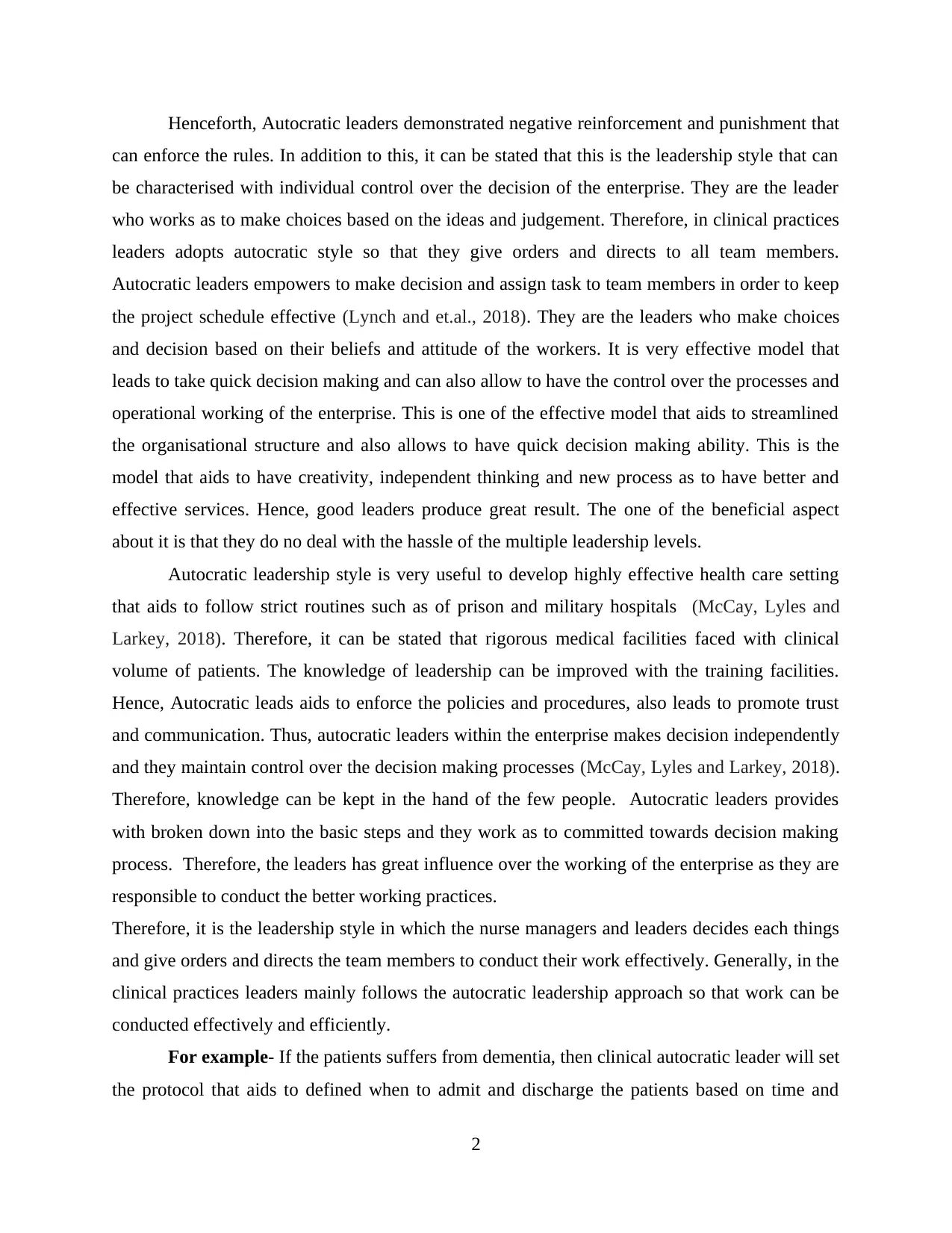
Henceforth, Autocratic leaders demonstrated negative reinforcement and punishment that
can enforce the rules. In addition to this, it can be stated that this is the leadership style that can
be characterised with individual control over the decision of the enterprise. They are the leader
who works as to make choices based on the ideas and judgement. Therefore, in clinical practices
leaders adopts autocratic style so that they give orders and directs to all team members.
Autocratic leaders empowers to make decision and assign task to team members in order to keep
the project schedule effective (Lynch and et.al., 2018). They are the leaders who make choices
and decision based on their beliefs and attitude of the workers. It is very effective model that
leads to take quick decision making and can also allow to have the control over the processes and
operational working of the enterprise. This is one of the effective model that aids to streamlined
the organisational structure and also allows to have quick decision making ability. This is the
model that aids to have creativity, independent thinking and new process as to have better and
effective services. Hence, good leaders produce great result. The one of the beneficial aspect
about it is that they do no deal with the hassle of the multiple leadership levels.
Autocratic leadership style is very useful to develop highly effective health care setting
that aids to follow strict routines such as of prison and military hospitals (McCay, Lyles and
Larkey, 2018). Therefore, it can be stated that rigorous medical facilities faced with clinical
volume of patients. The knowledge of leadership can be improved with the training facilities.
Hence, Autocratic leads aids to enforce the policies and procedures, also leads to promote trust
and communication. Thus, autocratic leaders within the enterprise makes decision independently
and they maintain control over the decision making processes (McCay, Lyles and Larkey, 2018).
Therefore, knowledge can be kept in the hand of the few people. Autocratic leaders provides
with broken down into the basic steps and they work as to committed towards decision making
process. Therefore, the leaders has great influence over the working of the enterprise as they are
responsible to conduct the better working practices.
Therefore, it is the leadership style in which the nurse managers and leaders decides each things
and give orders and directs the team members to conduct their work effectively. Generally, in the
clinical practices leaders mainly follows the autocratic leadership approach so that work can be
conducted effectively and efficiently.
For example- If the patients suffers from dementia, then clinical autocratic leader will set
the protocol that aids to defined when to admit and discharge the patients based on time and
2
can enforce the rules. In addition to this, it can be stated that this is the leadership style that can
be characterised with individual control over the decision of the enterprise. They are the leader
who works as to make choices based on the ideas and judgement. Therefore, in clinical practices
leaders adopts autocratic style so that they give orders and directs to all team members.
Autocratic leaders empowers to make decision and assign task to team members in order to keep
the project schedule effective (Lynch and et.al., 2018). They are the leaders who make choices
and decision based on their beliefs and attitude of the workers. It is very effective model that
leads to take quick decision making and can also allow to have the control over the processes and
operational working of the enterprise. This is one of the effective model that aids to streamlined
the organisational structure and also allows to have quick decision making ability. This is the
model that aids to have creativity, independent thinking and new process as to have better and
effective services. Hence, good leaders produce great result. The one of the beneficial aspect
about it is that they do no deal with the hassle of the multiple leadership levels.
Autocratic leadership style is very useful to develop highly effective health care setting
that aids to follow strict routines such as of prison and military hospitals (McCay, Lyles and
Larkey, 2018). Therefore, it can be stated that rigorous medical facilities faced with clinical
volume of patients. The knowledge of leadership can be improved with the training facilities.
Hence, Autocratic leads aids to enforce the policies and procedures, also leads to promote trust
and communication. Thus, autocratic leaders within the enterprise makes decision independently
and they maintain control over the decision making processes (McCay, Lyles and Larkey, 2018).
Therefore, knowledge can be kept in the hand of the few people. Autocratic leaders provides
with broken down into the basic steps and they work as to committed towards decision making
process. Therefore, the leaders has great influence over the working of the enterprise as they are
responsible to conduct the better working practices.
Therefore, it is the leadership style in which the nurse managers and leaders decides each things
and give orders and directs the team members to conduct their work effectively. Generally, in the
clinical practices leaders mainly follows the autocratic leadership approach so that work can be
conducted effectively and efficiently.
For example- If the patients suffers from dementia, then clinical autocratic leader will set
the protocol that aids to defined when to admit and discharge the patients based on time and
2
Paraphrase This Document
Need a fresh take? Get an instant paraphrase of this document with our AI Paraphraser
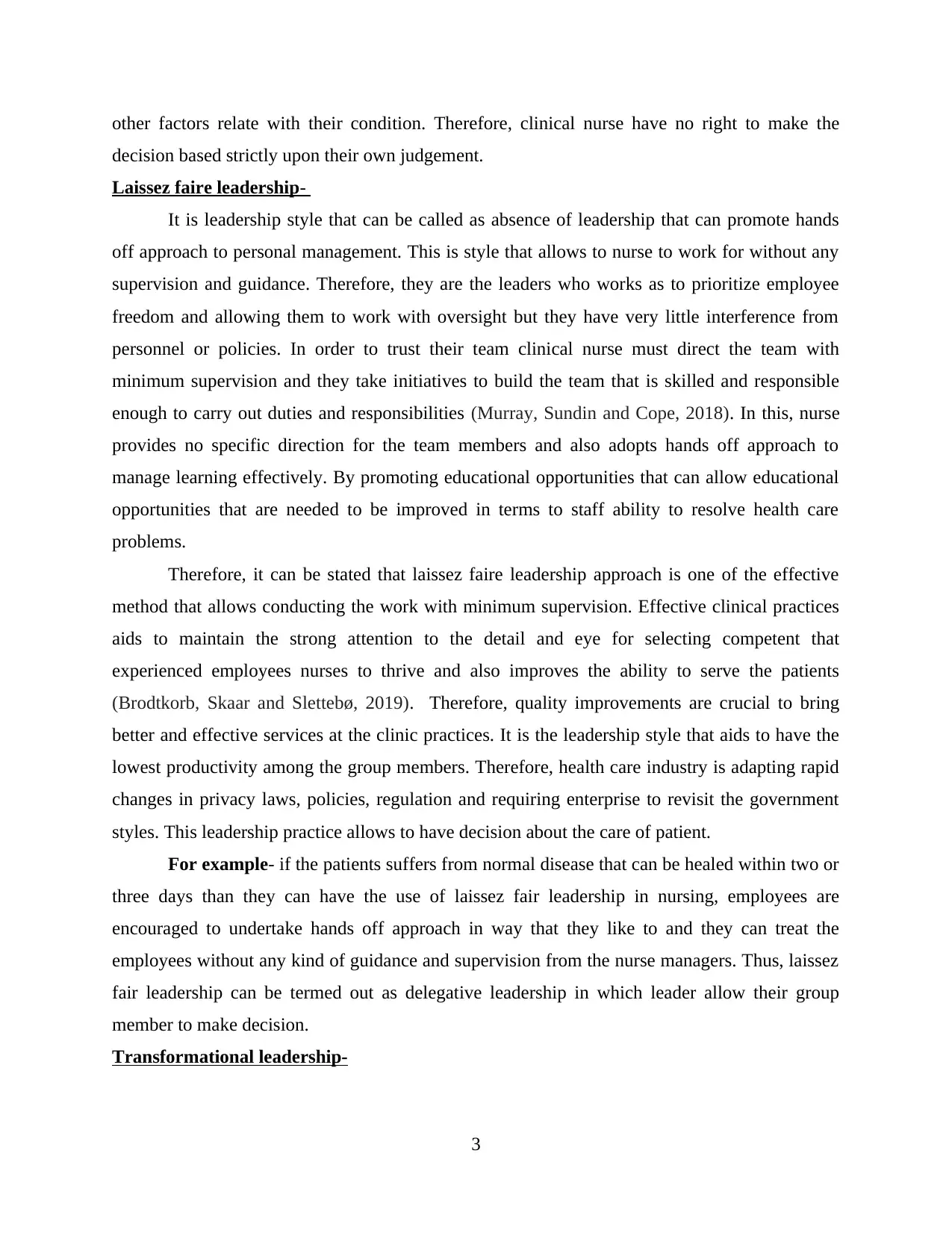
other factors relate with their condition. Therefore, clinical nurse have no right to make the
decision based strictly upon their own judgement.
Laissez faire leadership-
It is leadership style that can be called as absence of leadership that can promote hands
off approach to personal management. This is style that allows to nurse to work for without any
supervision and guidance. Therefore, they are the leaders who works as to prioritize employee
freedom and allowing them to work with oversight but they have very little interference from
personnel or policies. In order to trust their team clinical nurse must direct the team with
minimum supervision and they take initiatives to build the team that is skilled and responsible
enough to carry out duties and responsibilities (Murray, Sundin and Cope, 2018). In this, nurse
provides no specific direction for the team members and also adopts hands off approach to
manage learning effectively. By promoting educational opportunities that can allow educational
opportunities that are needed to be improved in terms to staff ability to resolve health care
problems.
Therefore, it can be stated that laissez faire leadership approach is one of the effective
method that allows conducting the work with minimum supervision. Effective clinical practices
aids to maintain the strong attention to the detail and eye for selecting competent that
experienced employees nurses to thrive and also improves the ability to serve the patients
(Brodtkorb, Skaar and Slettebø, 2019). Therefore, quality improvements are crucial to bring
better and effective services at the clinic practices. It is the leadership style that aids to have the
lowest productivity among the group members. Therefore, health care industry is adapting rapid
changes in privacy laws, policies, regulation and requiring enterprise to revisit the government
styles. This leadership practice allows to have decision about the care of patient.
For example- if the patients suffers from normal disease that can be healed within two or
three days than they can have the use of laissez fair leadership in nursing, employees are
encouraged to undertake hands off approach in way that they like to and they can treat the
employees without any kind of guidance and supervision from the nurse managers. Thus, laissez
fair leadership can be termed out as delegative leadership in which leader allow their group
member to make decision.
Transformational leadership-
3
decision based strictly upon their own judgement.
Laissez faire leadership-
It is leadership style that can be called as absence of leadership that can promote hands
off approach to personal management. This is style that allows to nurse to work for without any
supervision and guidance. Therefore, they are the leaders who works as to prioritize employee
freedom and allowing them to work with oversight but they have very little interference from
personnel or policies. In order to trust their team clinical nurse must direct the team with
minimum supervision and they take initiatives to build the team that is skilled and responsible
enough to carry out duties and responsibilities (Murray, Sundin and Cope, 2018). In this, nurse
provides no specific direction for the team members and also adopts hands off approach to
manage learning effectively. By promoting educational opportunities that can allow educational
opportunities that are needed to be improved in terms to staff ability to resolve health care
problems.
Therefore, it can be stated that laissez faire leadership approach is one of the effective
method that allows conducting the work with minimum supervision. Effective clinical practices
aids to maintain the strong attention to the detail and eye for selecting competent that
experienced employees nurses to thrive and also improves the ability to serve the patients
(Brodtkorb, Skaar and Slettebø, 2019). Therefore, quality improvements are crucial to bring
better and effective services at the clinic practices. It is the leadership style that aids to have the
lowest productivity among the group members. Therefore, health care industry is adapting rapid
changes in privacy laws, policies, regulation and requiring enterprise to revisit the government
styles. This leadership practice allows to have decision about the care of patient.
For example- if the patients suffers from normal disease that can be healed within two or
three days than they can have the use of laissez fair leadership in nursing, employees are
encouraged to undertake hands off approach in way that they like to and they can treat the
employees without any kind of guidance and supervision from the nurse managers. Thus, laissez
fair leadership can be termed out as delegative leadership in which leader allow their group
member to make decision.
Transformational leadership-
3
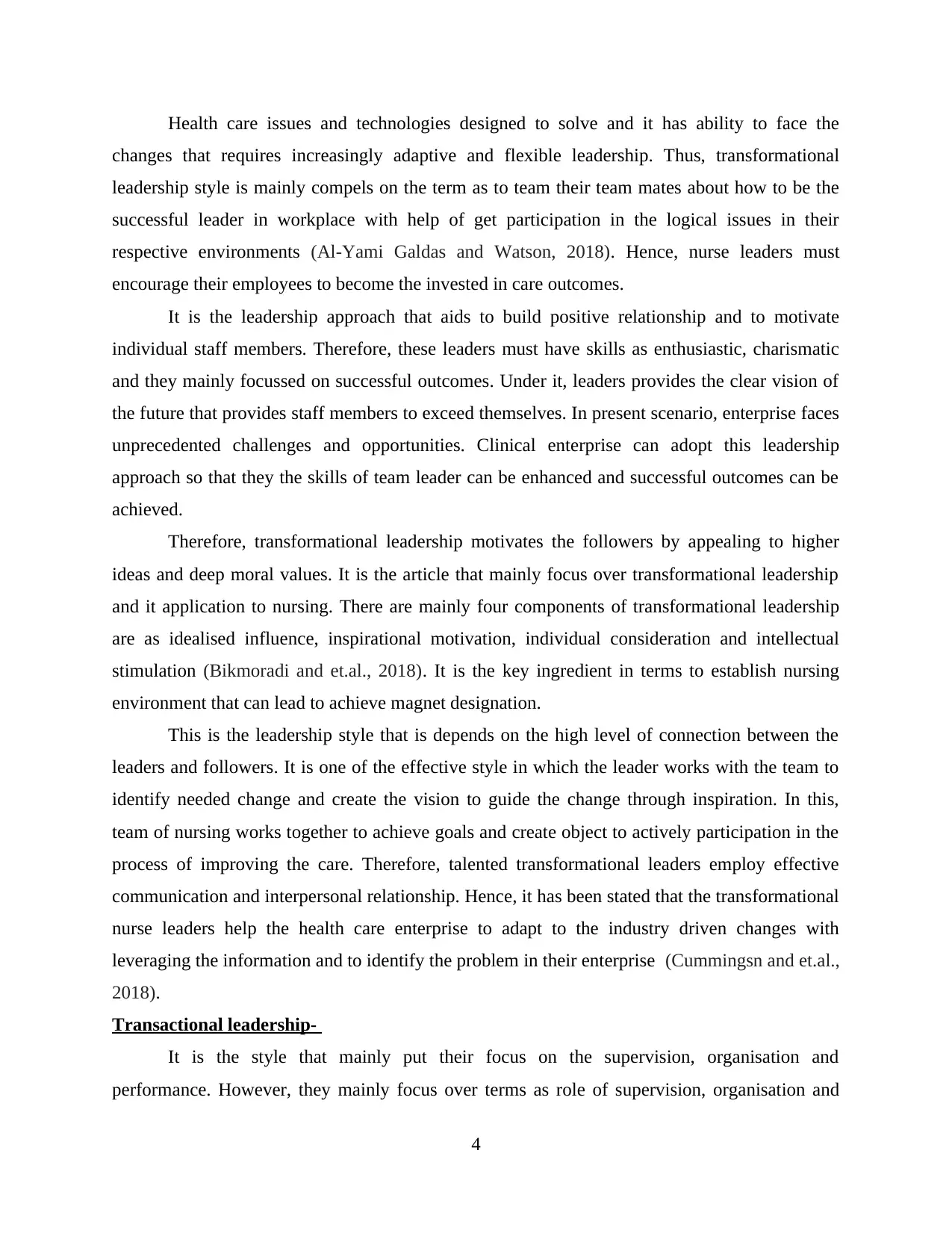
Health care issues and technologies designed to solve and it has ability to face the
changes that requires increasingly adaptive and flexible leadership. Thus, transformational
leadership style is mainly compels on the term as to team their team mates about how to be the
successful leader in workplace with help of get participation in the logical issues in their
respective environments (Al‐Yami Galdas and Watson, 2018). Hence, nurse leaders must
encourage their employees to become the invested in care outcomes.
It is the leadership approach that aids to build positive relationship and to motivate
individual staff members. Therefore, these leaders must have skills as enthusiastic, charismatic
and they mainly focussed on successful outcomes. Under it, leaders provides the clear vision of
the future that provides staff members to exceed themselves. In present scenario, enterprise faces
unprecedented challenges and opportunities. Clinical enterprise can adopt this leadership
approach so that they the skills of team leader can be enhanced and successful outcomes can be
achieved.
Therefore, transformational leadership motivates the followers by appealing to higher
ideas and deep moral values. It is the article that mainly focus over transformational leadership
and it application to nursing. There are mainly four components of transformational leadership
are as idealised influence, inspirational motivation, individual consideration and intellectual
stimulation (Bikmoradi and et.al., 2018). It is the key ingredient in terms to establish nursing
environment that can lead to achieve magnet designation.
This is the leadership style that is depends on the high level of connection between the
leaders and followers. It is one of the effective style in which the leader works with the team to
identify needed change and create the vision to guide the change through inspiration. In this,
team of nursing works together to achieve goals and create object to actively participation in the
process of improving the care. Therefore, talented transformational leaders employ effective
communication and interpersonal relationship. Hence, it has been stated that the transformational
nurse leaders help the health care enterprise to adapt to the industry driven changes with
leveraging the information and to identify the problem in their enterprise (Cummingsn and et.al.,
2018).
Transactional leadership-
It is the style that mainly put their focus on the supervision, organisation and
performance. However, they mainly focus over terms as role of supervision, organisation and
4
changes that requires increasingly adaptive and flexible leadership. Thus, transformational
leadership style is mainly compels on the term as to team their team mates about how to be the
successful leader in workplace with help of get participation in the logical issues in their
respective environments (Al‐Yami Galdas and Watson, 2018). Hence, nurse leaders must
encourage their employees to become the invested in care outcomes.
It is the leadership approach that aids to build positive relationship and to motivate
individual staff members. Therefore, these leaders must have skills as enthusiastic, charismatic
and they mainly focussed on successful outcomes. Under it, leaders provides the clear vision of
the future that provides staff members to exceed themselves. In present scenario, enterprise faces
unprecedented challenges and opportunities. Clinical enterprise can adopt this leadership
approach so that they the skills of team leader can be enhanced and successful outcomes can be
achieved.
Therefore, transformational leadership motivates the followers by appealing to higher
ideas and deep moral values. It is the article that mainly focus over transformational leadership
and it application to nursing. There are mainly four components of transformational leadership
are as idealised influence, inspirational motivation, individual consideration and intellectual
stimulation (Bikmoradi and et.al., 2018). It is the key ingredient in terms to establish nursing
environment that can lead to achieve magnet designation.
This is the leadership style that is depends on the high level of connection between the
leaders and followers. It is one of the effective style in which the leader works with the team to
identify needed change and create the vision to guide the change through inspiration. In this,
team of nursing works together to achieve goals and create object to actively participation in the
process of improving the care. Therefore, talented transformational leaders employ effective
communication and interpersonal relationship. Hence, it has been stated that the transformational
nurse leaders help the health care enterprise to adapt to the industry driven changes with
leveraging the information and to identify the problem in their enterprise (Cummingsn and et.al.,
2018).
Transactional leadership-
It is the style that mainly put their focus on the supervision, organisation and
performance. However, they mainly focus over terms as role of supervision, organisation and
4
⊘ This is a preview!⊘
Do you want full access?
Subscribe today to unlock all pages.

Trusted by 1+ million students worldwide
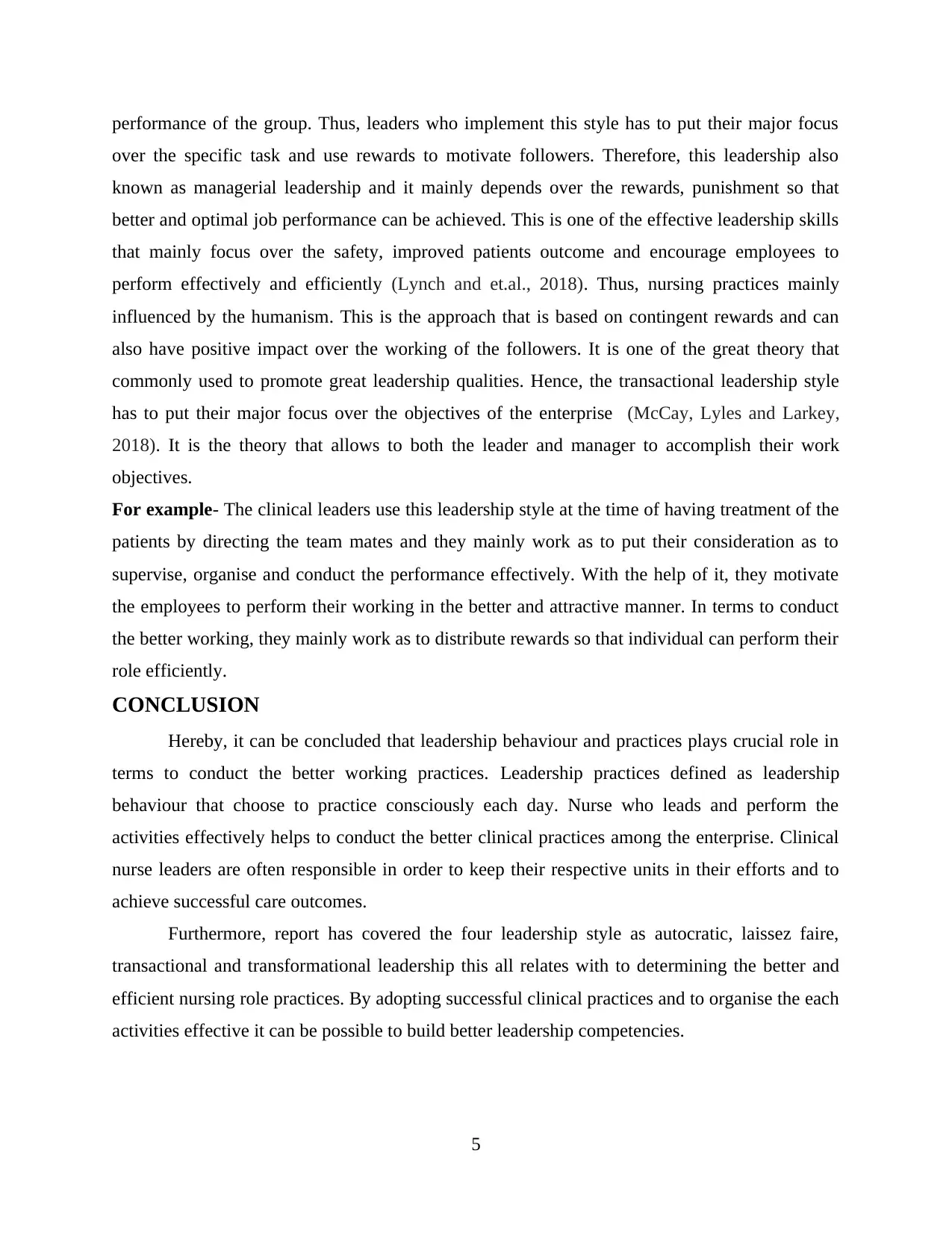
performance of the group. Thus, leaders who implement this style has to put their major focus
over the specific task and use rewards to motivate followers. Therefore, this leadership also
known as managerial leadership and it mainly depends over the rewards, punishment so that
better and optimal job performance can be achieved. This is one of the effective leadership skills
that mainly focus over the safety, improved patients outcome and encourage employees to
perform effectively and efficiently (Lynch and et.al., 2018). Thus, nursing practices mainly
influenced by the humanism. This is the approach that is based on contingent rewards and can
also have positive impact over the working of the followers. It is one of the great theory that
commonly used to promote great leadership qualities. Hence, the transactional leadership style
has to put their major focus over the objectives of the enterprise (McCay, Lyles and Larkey,
2018). It is the theory that allows to both the leader and manager to accomplish their work
objectives.
For example- The clinical leaders use this leadership style at the time of having treatment of the
patients by directing the team mates and they mainly work as to put their consideration as to
supervise, organise and conduct the performance effectively. With the help of it, they motivate
the employees to perform their working in the better and attractive manner. In terms to conduct
the better working, they mainly work as to distribute rewards so that individual can perform their
role efficiently.
CONCLUSION
Hereby, it can be concluded that leadership behaviour and practices plays crucial role in
terms to conduct the better working practices. Leadership practices defined as leadership
behaviour that choose to practice consciously each day. Nurse who leads and perform the
activities effectively helps to conduct the better clinical practices among the enterprise. Clinical
nurse leaders are often responsible in order to keep their respective units in their efforts and to
achieve successful care outcomes.
Furthermore, report has covered the four leadership style as autocratic, laissez faire,
transactional and transformational leadership this all relates with to determining the better and
efficient nursing role practices. By adopting successful clinical practices and to organise the each
activities effective it can be possible to build better leadership competencies.
5
over the specific task and use rewards to motivate followers. Therefore, this leadership also
known as managerial leadership and it mainly depends over the rewards, punishment so that
better and optimal job performance can be achieved. This is one of the effective leadership skills
that mainly focus over the safety, improved patients outcome and encourage employees to
perform effectively and efficiently (Lynch and et.al., 2018). Thus, nursing practices mainly
influenced by the humanism. This is the approach that is based on contingent rewards and can
also have positive impact over the working of the followers. It is one of the great theory that
commonly used to promote great leadership qualities. Hence, the transactional leadership style
has to put their major focus over the objectives of the enterprise (McCay, Lyles and Larkey,
2018). It is the theory that allows to both the leader and manager to accomplish their work
objectives.
For example- The clinical leaders use this leadership style at the time of having treatment of the
patients by directing the team mates and they mainly work as to put their consideration as to
supervise, organise and conduct the performance effectively. With the help of it, they motivate
the employees to perform their working in the better and attractive manner. In terms to conduct
the better working, they mainly work as to distribute rewards so that individual can perform their
role efficiently.
CONCLUSION
Hereby, it can be concluded that leadership behaviour and practices plays crucial role in
terms to conduct the better working practices. Leadership practices defined as leadership
behaviour that choose to practice consciously each day. Nurse who leads and perform the
activities effectively helps to conduct the better clinical practices among the enterprise. Clinical
nurse leaders are often responsible in order to keep their respective units in their efforts and to
achieve successful care outcomes.
Furthermore, report has covered the four leadership style as autocratic, laissez faire,
transactional and transformational leadership this all relates with to determining the better and
efficient nursing role practices. By adopting successful clinical practices and to organise the each
activities effective it can be possible to build better leadership competencies.
5
Paraphrase This Document
Need a fresh take? Get an instant paraphrase of this document with our AI Paraphraser

6

7
⊘ This is a preview!⊘
Do you want full access?
Subscribe today to unlock all pages.

Trusted by 1+ million students worldwide
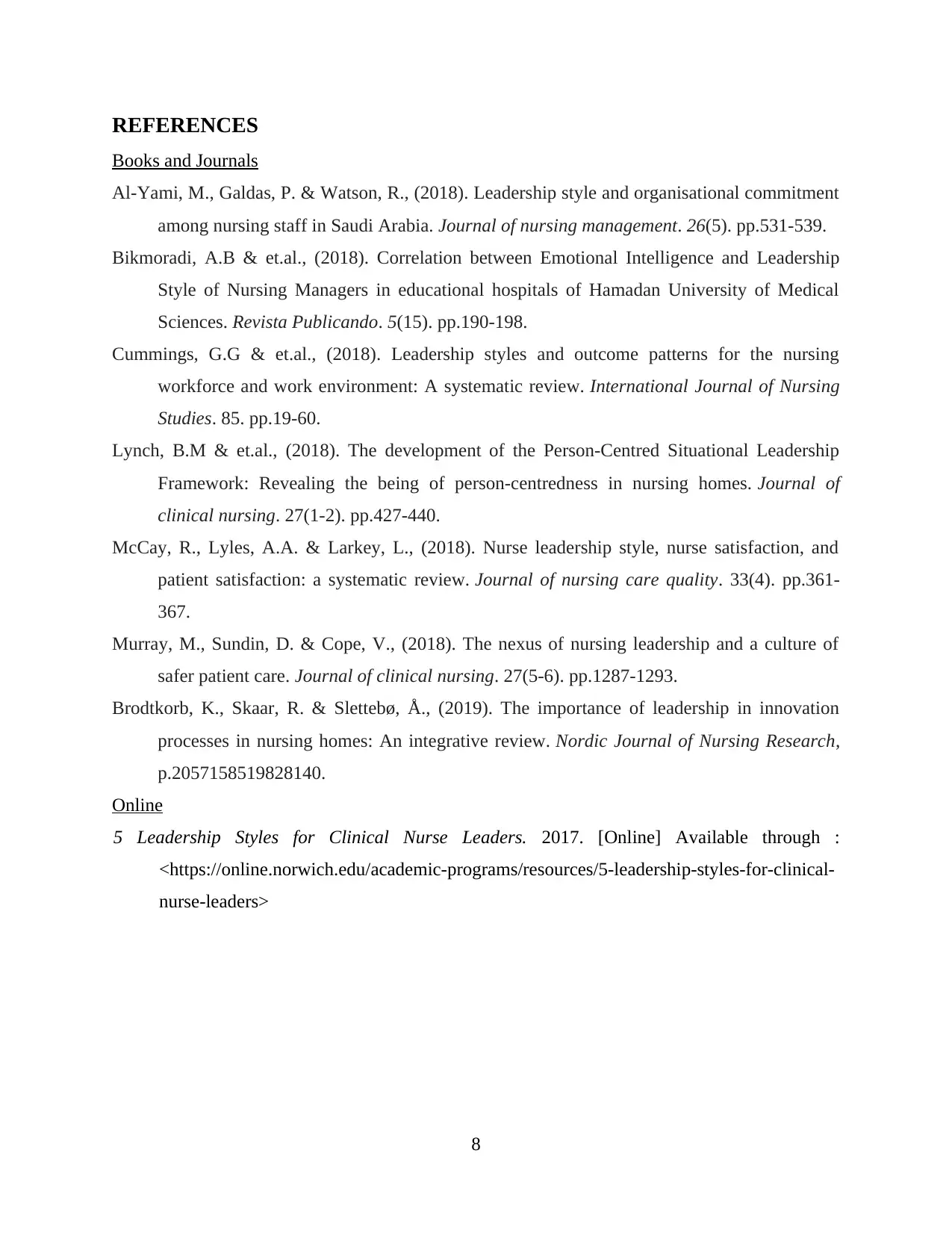
REFERENCES
Books and Journals
Al‐Yami, M., Galdas, P. & Watson, R., (2018). Leadership style and organisational commitment
among nursing staff in Saudi Arabia. Journal of nursing management. 26(5). pp.531-539.
Bikmoradi, A.B & et.al., (2018). Correlation between Emotional Intelligence and Leadership
Style of Nursing Managers in educational hospitals of Hamadan University of Medical
Sciences. Revista Publicando. 5(15). pp.190-198.
Cummings, G.G & et.al., (2018). Leadership styles and outcome patterns for the nursing
workforce and work environment: A systematic review. International Journal of Nursing
Studies. 85. pp.19-60.
Lynch, B.M & et.al., (2018). The development of the Person‐Centred Situational Leadership
Framework: Revealing the being of person‐centredness in nursing homes. Journal of
clinical nursing. 27(1-2). pp.427-440.
McCay, R., Lyles, A.A. & Larkey, L., (2018). Nurse leadership style, nurse satisfaction, and
patient satisfaction: a systematic review. Journal of nursing care quality. 33(4). pp.361-
367.
Murray, M., Sundin, D. & Cope, V., (2018). The nexus of nursing leadership and a culture of
safer patient care. Journal of clinical nursing. 27(5-6). pp.1287-1293.
Brodtkorb, K., Skaar, R. & Slettebø, Å., (2019). The importance of leadership in innovation
processes in nursing homes: An integrative review. Nordic Journal of Nursing Research,
p.2057158519828140.
Online
5 Leadership Styles for Clinical Nurse Leaders. 2017. [Online] Available through :
<https://online.norwich.edu/academic-programs/resources/5-leadership-styles-for-clinical-
nurse-leaders>
8
Books and Journals
Al‐Yami, M., Galdas, P. & Watson, R., (2018). Leadership style and organisational commitment
among nursing staff in Saudi Arabia. Journal of nursing management. 26(5). pp.531-539.
Bikmoradi, A.B & et.al., (2018). Correlation between Emotional Intelligence and Leadership
Style of Nursing Managers in educational hospitals of Hamadan University of Medical
Sciences. Revista Publicando. 5(15). pp.190-198.
Cummings, G.G & et.al., (2018). Leadership styles and outcome patterns for the nursing
workforce and work environment: A systematic review. International Journal of Nursing
Studies. 85. pp.19-60.
Lynch, B.M & et.al., (2018). The development of the Person‐Centred Situational Leadership
Framework: Revealing the being of person‐centredness in nursing homes. Journal of
clinical nursing. 27(1-2). pp.427-440.
McCay, R., Lyles, A.A. & Larkey, L., (2018). Nurse leadership style, nurse satisfaction, and
patient satisfaction: a systematic review. Journal of nursing care quality. 33(4). pp.361-
367.
Murray, M., Sundin, D. & Cope, V., (2018). The nexus of nursing leadership and a culture of
safer patient care. Journal of clinical nursing. 27(5-6). pp.1287-1293.
Brodtkorb, K., Skaar, R. & Slettebø, Å., (2019). The importance of leadership in innovation
processes in nursing homes: An integrative review. Nordic Journal of Nursing Research,
p.2057158519828140.
Online
5 Leadership Styles for Clinical Nurse Leaders. 2017. [Online] Available through :
<https://online.norwich.edu/academic-programs/resources/5-leadership-styles-for-clinical-
nurse-leaders>
8
1 out of 10
Related Documents
Your All-in-One AI-Powered Toolkit for Academic Success.
+13062052269
info@desklib.com
Available 24*7 on WhatsApp / Email
![[object Object]](/_next/static/media/star-bottom.7253800d.svg)
Unlock your academic potential
Copyright © 2020–2025 A2Z Services. All Rights Reserved. Developed and managed by ZUCOL.




